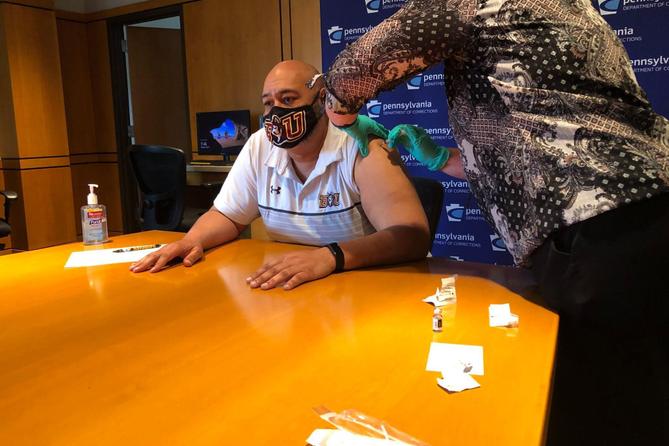Spotlight PA is an independent, nonpartisan newsroom powered by The Philadelphia Inquirer in partnership with PennLive/The Patriot-News, TribLIVE/Pittsburgh Tribune-Review, and WITF Public Media. Sign up for our free newsletters.
HARRISBURG — A delayed upgrade to the state Department of Corrections’ dashboard on COVID-19 rates in prisons has revealed that only 20% of correctional staff and officers who work in prisons have reported being vaccinated.
Alternatively, according to the Centers for Disease Control and Prevention, more than half of all American adults have received at least one shot, which is similar to the number of incarcerated people in Pennsylvania who have gotten one.
The department relaunched its public-facing data last week with updated vaccine numbers, one month after its self-imposed deadline. Spotlight PA revealed in January that its data were unreliable, prompting the dashboard to be temporarily removed for an overhaul.
The new site shows that as of April 21, out of 15,852 correctional staffers, only 3,133 were fully or partially vaccinated. At facilities in Albion, Fayette, Pine Grove, and Smithfield, 90% of staff or more remained unvaccinated.
In contrast, as of the same date, out of 37,245 people held inside facilities, 19,490 have received a vaccine.
Corrections spokesperson Maria Bivens noted that staff vaccinations are self-reported, meaning the number could be artificially low if large numbers of staffers are not reporting getting shots.
The Corrections Officers Association, the union representing prison workers, declined to comment or answer questions on why their members weren’t getting vaccinated, or what they’ve been doing to increase vaccinations.
Dr. Amesh Adalja, a senior scholar at Johns Hopkins Center for Health Security, said the contrast puts the officers and their communities at risk, and especially people in prison who either chose not to get vaccinated or are still waiting.
People in prison are dependent on the state for their vaccinations, while all staff are eligible to pursue theirs on their own. Both were offered incentives: paid time off for workers, and $25 in commissary benefits for people living inside the prisons.
“If there’s a cadre of [corrections officers] in a given facility not vaccinated … that workplace would still have a risk of COVID, just not emanating from the prisoners themselves,” Adalja said.
Prisons are COVID-19 hot spots, Adalja said, with shared quarters and cells where people are confined for up to 23 hours a day during lockdown. And though it’s good for public health that the majority of incarcerated people are vaccinated, if staff fall ill, it could jeopardize safety by depleting staff numbers and “would be disruptive to the operations of a prison,” he said.
Corrections officials have already struggled with shortages because of the virus, as well as maintaining the right protocols to limit the spread.
With prisons initially lauded for keeping case numbers low, incarcerated people started becoming infected and dying at higher rates than populations on the outside during the second wave in December.
The department applied for $176,000 in emergency funds to hire temporary workers because too many staff were calling out of work. Then, Spotlight PA found that officers were still told by corrections to come back to work before doctors had cleared them.
And now, corrections staff have been diagnosed with more COVID-19 cases than incarcerated people. The department’s dashboard shows that as of April 21, 125 staff members are currently out for testing positive, compared with only 70 incarcerated people who are currently positive.
This struggle spans to other state facilities. A report by the Department of Health last week found only 52% of nursing home staff had received the vaccine, compared with 80% of nursing home residents. In some counties, nursing home vaccinations among staff were as low as 30%, despite a national goal to hit 75% vaccinated inside facilities by June.
Keara Klinepeter, executive deputy secretary for the Department of Health, said that the department is working with staff in areas with low vaccine uptake to address hesitations.
Corrections has also made efforts to encourage staff to get the shot and educate them about its efficacy, but that messaging was complicated in recent weeks.
On April 9, the department reported one death of a person inside SCI-Phoenix who had received a single-dose Johnson & Johnson vaccine.
The department told people living inside prisons that “there had been an unexpected death of an inmate that had recently been vaccinated for COVID-19,” according to the memo, obtained by Spotlight PA.
Then on April 13, the department had to stop issuing J&J vaccines along with the rest of the state and then the country, as regulators established six cases of rare blood-clotting issues, including a Pennsylvania woman.
Corrections officials still have Moderna vaccines, which Bivens said they are continuing to use for staff and other people inside facilities.
“There’s already been hesitancy around the vaccine by incarcerated people, with people saying it’s been rushed … and corrections officers denying it doesn’t instill much confidence for others to get it,” said Poornima Rajeshwar, a policy fellow at the UCLA Law COVID-19 Behind Bars Data Project. “It is a concern to see how the J&J halt might affect people in the future getting it.”
WHILE YOU’RE HERE… If you learned something from this story, pay it forward and become a member of Spotlight PA so someone else can in the future at spotlightpa.org/donate. Spotlight PA is funded by foundations and readers like you who are committed to accountability journalism that gets results.

